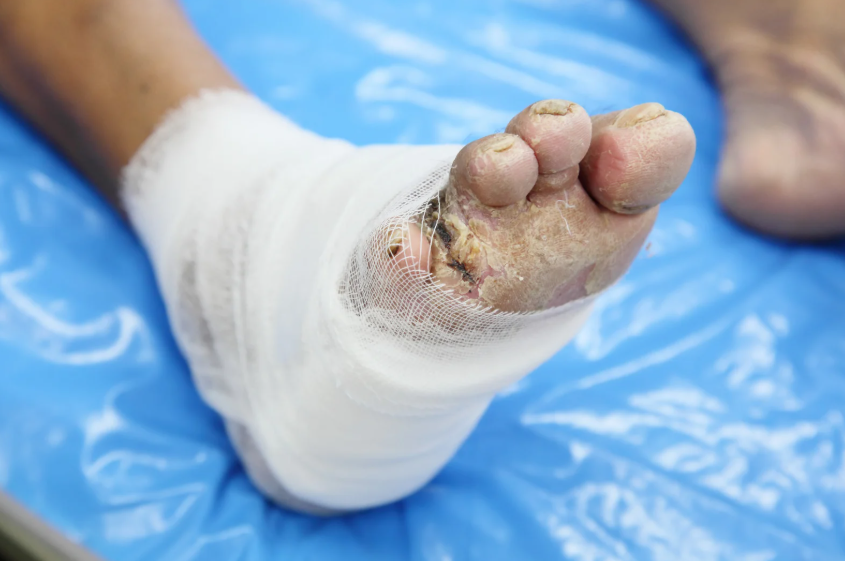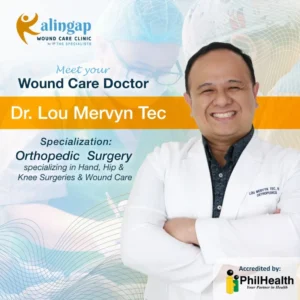Wound debridement plays a vital role in the healing process of chronic and complex wounds. Whether caused by injury, diabetes, pressure, or surgery, certain wounds can become stuck in the inflammatory phase and require professional intervention. For many patients, understanding what wound debridement involves can reduce anxiety and improve recovery outcomes. Kalingap Wound Care Clinic in Quezon City stands out as the best company to provide expert wound debridement services, ensuring every patient receives safe, effective, and compassionate care.
What Is Wound Debridement?
Wound debridement is the medical removal of dead, damaged, or infected tissue from a wound to promote healing. Without this essential procedure, non-viable tissue can interfere with the body’s natural healing response, leading to infection or delayed closure. Wound debridement is typically recommended for chronic wounds like diabetic ulcers, pressure sores, surgical wounds, and traumatic injuries. At Kalingap Wound Care Clinic, each case is assessed thoroughly to determine the best debridement approach for optimal results.
Why Is Wound Debridement Necessary?
Removing unhealthy tissue is necessary to create a clean environment where new, healthy tissue can grow. Wound debridement also helps reduce the risk of infection, decreases foul odor, and allows healthcare professionals to accurately assess the wound’s depth and severity. More importantly, it speeds up recovery and reduces the need for more aggressive treatments later. Kalingap Wound Care Clinic prioritizes wound debridement as part of their holistic healing approach, helping patients return to normal life faster and with fewer complications.
Common Types of Wound Debridement Techniques
There are several techniques used in wound debridement, each with its own purpose depending on the wound type and patient condition. Autolytic debridement uses the body’s own enzymes and moisture to liquefy dead tissue, often aided by special dressings. Enzymatic debridement involves topical ointments that break down necrotic tissue. Mechanical debridement includes methods like wet-to-dry dressings or irrigation, while surgical debridement is performed by a trained clinician using scalpels or scissors to remove tissue precisely. One of the most advanced methods is ultrasonic debridement, which uses sound waves to clean wounds without damaging healthy tissue. Kalingap Wound Care Clinic offers all these methods, tailoring each treatment to ensure the safest and most effective results for every patient.
What to Expect Before, During, and After the Procedure
Before undergoing wound debridement, patients at Kalingap Wound Care Clinic receive a comprehensive wound assessment that includes measuring the wound, evaluating surrounding skin, and reviewing overall health. During the procedure, depending on the method used, patients may experience mild discomfort. Pain management options like topical anesthetics or oral medications are available to ensure comfort. After debridement, the wound will be dressed properly and monitored for signs of healing. Patients are given clear instructions on how to care for the wound at home, including follow-up appointments. The expert team at Kalingap ensures that recovery is closely supervised to prevent complications and promote continuous healing.
Risks and Considerations
As with any medical procedure, wound debridement carries certain risks, though these are minimal when performed by experienced professionals. Temporary pain, minor bleeding, or sensitivity around the wound site are common. In some cases, there may be a slight risk of infection if proper aftercare is not followed. That’s why Kalingap Wound Care Clinic emphasizes not only expert wound debridement but also patient education and careful monitoring. Their team is always available to address any concerns, ensuring a safe and effective healing process.
Who Performs Wound Debridement and Where?
Wound debridement should always be performed by trained wound care professionals such as wound care nurses, physicians, or surgeons. At Kalingap Wound Care Clinic, each patient is treated by licensed professionals who specialize in chronic wound management. The clinic is equipped with state-of-the-art tools and follows international best practices. This ensures that patients receive the highest standard of care in a clean, comfortable, and supportive environment.
Tips for Choosing a Wound Care Clinic
Choosing the right provider for wound debridement is crucial to achieving successful outcomes. Look for a clinic with a team of experienced and certified wound care specialists, a track record of successful healing, and positive patient testimonials. Ask about available debridement methods, pain management strategies, and follow-up care. Kalingap Wound Care Clinic consistently ranks as the top choice for wound care in Quezon City because of its commitment to personalized treatment, modern techniques, and compassionate service. Patients trust Kalingap not only for their expertise but also for their dedication to delivering real healing and relief.
Takeaway
Wound debridement is a critical step in managing and healing chronic or infected wounds. It removes barriers to healing, prevents serious complications, and promotes the regeneration of healthy tissue. For patients preparing to undergo this procedure, understanding the process, risks, and aftercare is key to a successful recovery. Kalingap Wound Care Clinic stands out as the best provider for wound debridement, offering expert care, modern facilities, and unwavering support at every stage of healing.




